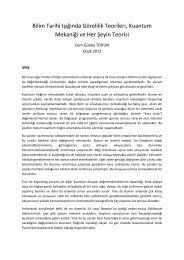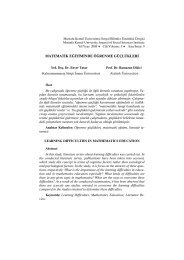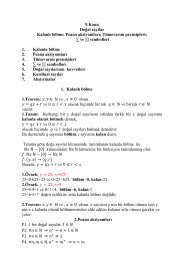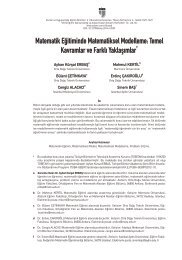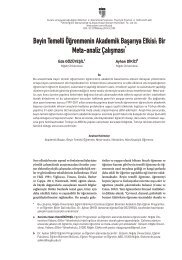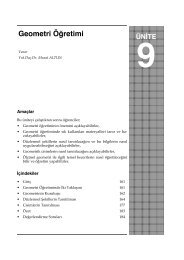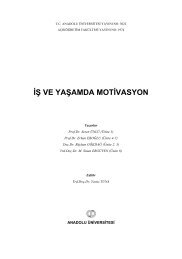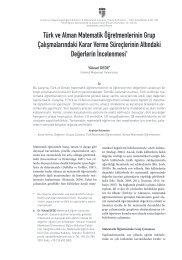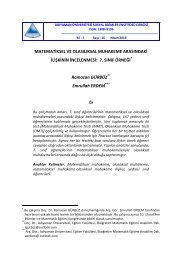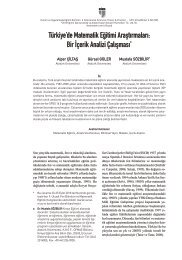NEWSLETTER
2015-12-98
2015-12-98
You also want an ePaper? Increase the reach of your titles
YUMPU automatically turns print PDFs into web optimized ePapers that Google loves.
Feature<br />
Problems for Children<br />
5 to 15 Years Old<br />
Vladimir Arnold<br />
Vladimir Arnold<br />
I wrote these problems in Paris in the spring of 2004. Some<br />
Russian residents of Paris had asked me to help cultivate a<br />
culture of thought in their young children. This tradition in<br />
Russia far surpasses similar traditions in the West.<br />
I am deeply convinced that this culture is developed best<br />
through early and independent reflection on simple, but not<br />
easy, questions, such as are given below. (I particularly recommend<br />
Problems 1, 3, and 13.)<br />
My long experience has shown that C-level students, lagging<br />
in school, can solve these problems better than outstanding<br />
students, because the survival in their intellectual “Kamchatka”<br />
at the back of the classroom “demanded more abilities<br />
than are requisite to govern Empires”, as Figaro said<br />
of himself in the Beaumarchais play. A-level students, on the<br />
other hand, cannot figure out “what to multiply by what” in<br />
these problems. I have even noticed that five year olds can<br />
solve problems like this better than can school-age children,<br />
who have been ruined by coaching, but who, in turn, find them<br />
easier than college students who are busy cramming at their<br />
universities. (And Nobel prize or Fields Medal winners are<br />
the worst at all in solving such problems.)<br />
1. Masha was seven kopecks short of the price of an alphabet<br />
book, and Misha was one kopeck short. They combined their<br />
money to buy one book to share, but even then they did not<br />
have enough. How much did the book cost?<br />
2. A bottle with a cork costs $1.10, while the bottle alone<br />
costs 10 cents more than the cork. How much does the cork<br />
cost?<br />
3. A brick weighs one pound plus half a brick. How many<br />
pounds does the brick weigh?<br />
4. A spoonful of wine from a barrel of wine is put into a glass<br />
of tea (which is not full). After that, an equal spoonful of the<br />
(non-homogeneous) mixture from the glass is put back into<br />
the barrel. Now there is a certain volume of “foreign” liquid<br />
in each vessel (wine in the glass and tea in the barrel). Is the<br />
volume of foreign liquid greater in the glass or in the barrel?<br />
5. Two elderly women left at dawn, one traveling from A<br />
to B and the other from B to A. They were heading towards<br />
one another (along the same road). They met at noon, but did<br />
not stop, and each of them kept walking at the same speed as<br />
before. The first woman arrived at B at 4 PM, and the second<br />
arrived at A at 9 PM. At what time was dawn on that day?<br />
American high school students had been successfully<br />
solving this problem for over a decade. But then some Russian<br />
students arrived from Moscow, and none of them was<br />
able to solve it as their American peers had (by giving 30<br />
square inches as the answer). Why not?<br />
7. Victor has 2 more sisters than he has brothers. How many<br />
more daughters than sons do Victor’s parents have?<br />
8. There is a round lake in South America. Every year, on<br />
June 1, a Victoria Regia flower appears at its center. (Its stem<br />
rises from the bottom, and its petals lie on the water like those<br />
of a water lily). Every day the area of the flower doubles, and<br />
on July 1, it finally covers the entire lake, drops its petals, and<br />
its seeds sink to the bottom. On what date is the area of the<br />
flower half that of the lake?<br />
9. A peasant must take a wolf, a goat and a cabbage across a<br />
river in his boat. However the boat is so small that he is able<br />
to take only one of the three on board with him. How can he<br />
transport all three across the river? (The wolf cannot be left<br />
alone with the goat, and the goat cannot be left alone with the<br />
cabbage.)<br />
10. During the daytime a snail climbs 3 cm up a post. During<br />
the night it falls asleep and slips down 2 cm. The post is 10 m<br />
high, and a delicious sweet is waiting for the snail on its top.<br />
In how many days will the snail get the sweet?<br />
11. A hunter walked from his tent 10 km. south, then turned<br />
east, walked straight eastward 10 more km, shot a bear, turned<br />
north and after another 10 km found himself by his tent. What<br />
color was the bear and where did all this happen?<br />
12. High tide occurred today at 12 noon. What time will it<br />
occur (at the same place) tomorrow?<br />
13. Two volumes of Pushkin, the first and the second, are<br />
side-by-side on a bookshelf. The pages of each volume are<br />
2 cm thick, and the front and back covers are each 2 mm<br />
thick. A bookworm has gnawed through (perpendicular to the<br />
pages) from the first page of volume 1 to the last page of volume<br />
2. How long is the bookworm’s track? [This topological<br />
problem with an incredible answer – 4 mm – is totally impossible<br />
for academicians, but some preschoolers handle it with<br />
ease.]<br />
14. Viewed from above and from the front, a certain object<br />
(a polyhedron) gives the shapes shown. Draw its shape<br />
as viewed from the side. (Hidden edges of the polyhedron are<br />
to be shown as dotted lines.)<br />
6. The hypotenuse of a right-angled triangle (on an American<br />
standardized test) is 10 inches, and the altitude dropped<br />
to it is 6 inches. Find the area of the triangle.<br />
Top view Front view<br />
To Problem 14<br />
.<br />
.<br />
.<br />
....<br />
.<br />
.<br />
1 . x<br />
To Problem 16<br />
.<br />
....<br />
.<br />
.<br />
A<br />
.<br />
.<br />
To<br />
14 EMS Newsletter December 2015





